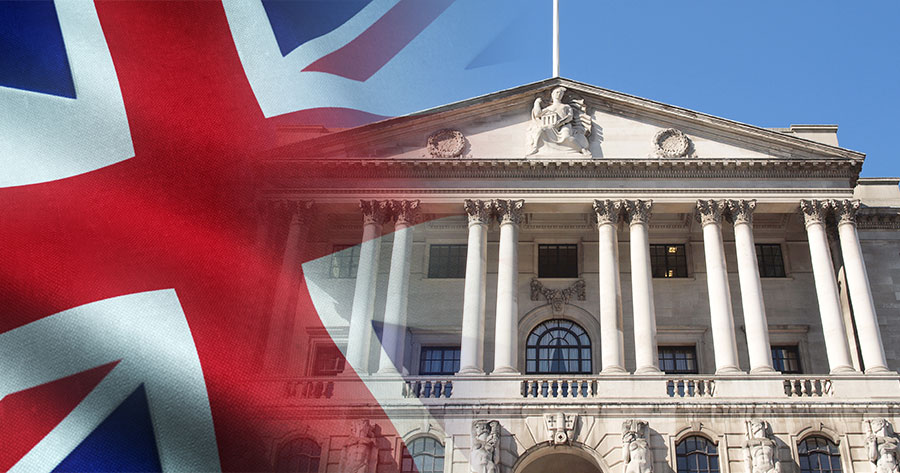
The Bank of England raised interest rates by the most since 1989 on Thursday but it also warned that Britain faced a long recession and told investors borrowing costs were likely to go up by less than they expect.
The BoE increased Bank Rate to 3% from 2.25% even as it said Britain’s economy might not grow for another two years, a slump longer than during the 2008-09 financial crisis.
The pound fell sharply and was down about 2% against the U.S. dollar at 1315 GMT, touching its lowest since mid-October when Britain was in a political crisis triggered by former prime minister Liz Truss’ tax-cutting plans.
On Wednesday, the U.S. Federal Reserve also hiked rates by 75 basis points but signalled U.S. borrowing costs were likely to rise more than anticipated to crush inflation.
That contrasted with the BoE’s message on Thursday.
“We can’t make promises about future interest rates but based on where we stand today, we think Bank Rate will have to go up by less than currently priced in financial markets,” Governor Andrew Bailey said, in an unusually blunt message.
The BoE said it now expected inflation will hit a 40-year high of around 11% during the current quarter. But it also thinks the economy has entered a recession that could mean it contracts in both 2023 and 2024 and shrinks by 2.9% in total.
Unemployment would rise steadily to 6.4% by late 2025, nearly doubling from a current 3.5%, its lowest rate since the mid-1970s.
Thursday’s rise in borrowing costs – the biggest in 33 years apart from a failed attempt to support the pound on Black Wednesday in 1992 – was in line with economists’ expectations in a Reuters poll, but was not unanimous.
Two policymakers, Silvana Tenreyro and Swati Dhingra, voted for smaller increases of a quarter and half a percentage point respectively.
The majority of the nine-member Monetary Policy Committee said rates would need to rise higher still, although probably not as high as the 5.2% that was priced into financial markets when the BoE finalised its forecasts.
“Further increases in Bank Rate might be required for a sustainable return of inflation to target, albeit to a peak lower than priced into financial markets,” the BoE said, offering unusually specific guidance to investors.
Earlier on Thursday, markets were expecting Bank Rate to peak at around 4.75%. After its announcement, that peak had fallen to under 4.7% in September next year.
“The Committee continues to judge that, if the outlook suggests more persistent inflationary pressures, it will respond forcefully, as necessary,” the MPC added, echoing its previous guidance.
TURMOIL IN BRITAIN
Central banks across the Western world are responding to similar challenges. Inflation has rocketed over the past year due to residual labour shortages and supply-chain bottlenecks since the COVID pandemic and – in Europe’s case – a big increase in energy bills since Russia invaded Ukraine in February.
Britain’s new finance minister Jeremy Hunt said the “government’s number one priority is to grip inflation, and today the Bank has taken action in line with their objective to return inflation to target”.
The BoE has faced weeks of political and financial market chaos since its last rate rise on Sept. 22.
Just a day later, then-prime minister Truss’s government launched an unfunded 45 billion-pound ($52 billion) package of tax cuts that received a damning response from investors that pushed sterling to a record low against the dollar and forced the BoE to prop up the bond market to help pension funds.
Truss had to resign after 44 days in office.
Markets are now more stable, with British government borrowing costs broadly back to where they were before the turmoil. On Tuesday, the BoE was able to begin selling bonds from its 838 billion-pound quantitative easing stockpile.
The BoE’s policymaking is made especially tricky by a lack of clarity over future government policy.
While most of Truss’s tax cuts have been reversed, new Prime Minister Rishi Sunak has indicated there will be a squeeze on public spending and potentially higher taxes, the scale of which will not become clear until a fiscal statement on Nov. 17.
–Reuters
A member of the All Progressives Congress (APC), Joe Igbokwe, has said Seyi Tinubu, son…
IPOB PRESS RELEASE 22/11/2024 SIMON EKPA IS NOT AN IPOB MEMBER AND MUST NOT BE…
NEWSPAPER HEADLINES FOR FRIDAY 22ND NOVEMBER 2024. *PUNCH* Gombe begins N28bn Assembly, high court complexes…
Former bread seller turned model, Olajumoke Orisaguna, popularly known as Olajumoke Onibread, has opened up…
Senate Majority Leader, Opeyemi Bamidele has denies reports that he was involved in a fight…
– says lawmakers united to meet yearnings of Lagosians – accuses detractors of peddling news…